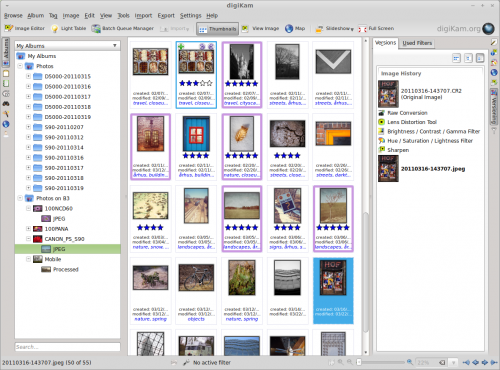Digikam/Versioning/da: Difference between revisions
(Importing a new version from external source) |
(Importing a new version from external source) |
||
| Line 5: | Line 5: | ||
Når du justerer fotos i '''digiKam''', så er det nok en god ide at bevare originalerne uændrede. Til dette formål er funktionen ''Versionering'' nyttig. Den lader dig gemme en redigeret udgave af et originalt foto som et separat billede med en liste over alle anvendte handlinger. | Når du justerer fotos i '''digiKam''', så er det nok en god ide at bevare originalerne uændrede. Til dette formål er funktionen ''Versionering'' nyttig. Den lader dig gemme en redigeret udgave af et originalt foto som et separat billede med en liste over alle anvendte handlinger. | ||
Den måde versionering virker på er ligetil. Når du er klar til at gemme et modificeret foto, så klikker du på knappen <menuchoice>Gem som en ny version</menuchoice>. Dette gemmer den redigerede udgave som en nyt billede. Bemærk, at hvis du arbejder med RAW-filer, så vil alle versioner automatisk blive konverteret til et at de understøttede grafikformater. Som standard bruges JPEG, men du kan skifte til et andet af de understøttede formater. For at gøre dette vælger du menuen <menuchoice>Indstillinger -> Indstil digiKam...</menuchoice>, går til afsnittet <menuchoice>Billedredigering</menuchoice> og vælg det ønskede format i dropned-listen <menuchoice>Gem filer som</menuchoice> For at omgå de overordnede indstillinger, kan du gemme en enkelt version i et andet format ved at klikke på trekanten og vælge det ønskede format fra menuen <menuchoice>Gem i format</menuchoice>. | |||
By default, each version is automatically saved in the same album as the original, so you can end up with multiple thumbnails of the same photo in the album. But '''digiKam''' provides an elegant solution to the problem: you can combine the original and all its versions into a single group. To do this, select the original and its versions, right-click on the selection and choose the <menuchoice>Group Selected Here</menuchoice> command. This combines all the selected photos as one neat bundle, and an icon in the lower-right corner of the thumbnail displays the number of images in the group. Alternatively, you can save the version in a separate album: click on the triangle next to the <menuchoice>Save As New Version</menuchoice> button, select the <menuchoice>Save New Version as</menuchoice> command, and pick the destination folder. | By default, each version is automatically saved in the same album as the original, so you can end up with multiple thumbnails of the same photo in the album. But '''digiKam''' provides an elegant solution to the problem: you can combine the original and all its versions into a single group. To do this, select the original and its versions, right-click on the selection and choose the <menuchoice>Group Selected Here</menuchoice> command. This combines all the selected photos as one neat bundle, and an icon in the lower-right corner of the thumbnail displays the number of images in the group. Alternatively, you can save the version in a separate album: click on the triangle next to the <menuchoice>Save As New Version</menuchoice> button, select the <menuchoice>Save New Version as</menuchoice> command, and pick the destination folder. | ||
Revision as of 10:05, 1 April 2011
Versionering i digiKam 2
Fra Dmitri Popovs blog, 28. marts 2011
Når du justerer fotos i digiKam, så er det nok en god ide at bevare originalerne uændrede. Til dette formål er funktionen Versionering nyttig. Den lader dig gemme en redigeret udgave af et originalt foto som et separat billede med en liste over alle anvendte handlinger.
Den måde versionering virker på er ligetil. Når du er klar til at gemme et modificeret foto, så klikker du på knappen . Dette gemmer den redigerede udgave som en nyt billede. Bemærk, at hvis du arbejder med RAW-filer, så vil alle versioner automatisk blive konverteret til et at de understøttede grafikformater. Som standard bruges JPEG, men du kan skifte til et andet af de understøttede formater. For at gøre dette vælger du menuen , går til afsnittet og vælg det ønskede format i dropned-listen For at omgå de overordnede indstillinger, kan du gemme en enkelt version i et andet format ved at klikke på trekanten og vælge det ønskede format fra menuen .
By default, each version is automatically saved in the same album as the original, so you can end up with multiple thumbnails of the same photo in the album. But digiKam provides an elegant solution to the problem: you can combine the original and all its versions into a single group. To do this, select the original and its versions, right-click on the selection and choose the command. This combines all the selected photos as one neat bundle, and an icon in the lower-right corner of the thumbnail displays the number of images in the group. Alternatively, you can save the version in a separate album: click on the triangle next to the button, select the command, and pick the destination folder.

To view all versions of a photo, select the original in its album, and expand the right . You should then see all versions of the selected photo with a complete list of editing actions.
